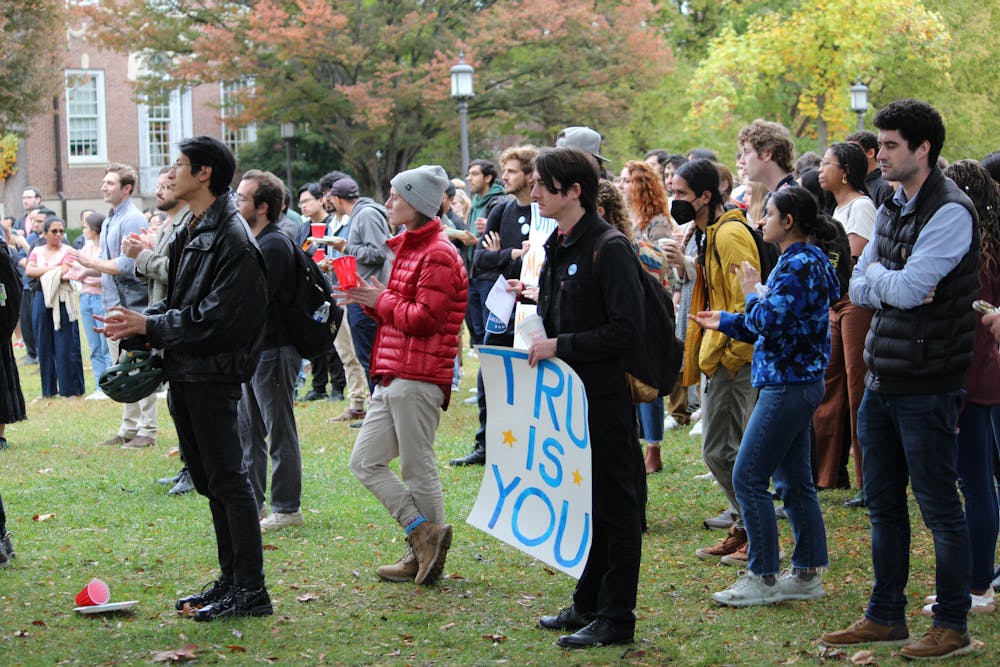The Teachers and Researchers United (TRU), an unofficial graduate student union, held a rally for fair wages in Keyser Quad on Oct. 25. Affiliated with United Electrical, Radio and Machine Workers of America (UE), TRU kicked off the process to be formally recognized as a union by the University by hosting a union card drive.
The National Labor Relations Act (NLRA) states that after 30% of employees submit a union card, the organization can file a petition for a union election to the National Labor Relations Board (NLRB). The election requires a simple majority to vote for a union, and after this the union must be recognized by the University.
Additionally, the University can also choose to recognize TRU as a union based on evidence at any time.
In an interview with The News-Letter, Peter Weck, a doctoral student in the Physics and Astronomy department, detailed that TRU first organized in 2014 to advocate for covered vision and dental insurance for graduate students. Throughout the years, TRU has called for increased funding for graduate students during the COVID-19 pandemic, safer working conditions and clearer methods of formalized grievance procedures.
According to Weck, because of the rising cost-of-living expenses and inflation, most graduate students' stipends do not reflect a living wage even if they serve in teaching and researching roles.
“I have coworkers who tell me that they literally have to choose what to put back in the grocery store when shopping,“ he said. “That shouldn't be an experience that any [doctoral] student should have to face.”
In an interview with The News-Letter, Kathryn Stutz, a fourth-year graduate student in the Classics department, noted that unionizing would allow for more recognition from the administration.
“Hopefully, this will encourage the school to take seriously the work that is being done by doctoral students, many of whom, like myself, are primary instructors,“ she said. “I have neither a parking place nor an office and that makes it very hard to do my job.”
Caleb Andrews, a doctoral student in the Material Sciences department and Security Concerns Chair of the Graduate Representative Organization (GRO), opened the rally by emphasizing the importance of the graduate students' work within the University.
“We are the workers that make this university run and without our brains and muscle, all those billions in the Hopkins endowment is meaningless,” he said.
He stressed the need of a contract to ensure that graduate student wages would be increased every year.
Andrews voiced his frustrations with how the University seemed to only listen to the voices they wanted to hear.
“It is clear he did not value us as individuals, so we have no choice but to unite our voices as one loud and clear as we rally behind the banner of the union,” he said.
In an email to The News-Letter, Director of Strategic Communications Megan Christin wrote that the administration respects the right of students to organize.
“For our graduate students, the choice of whether or not to join a union is a personal decision that is entirely up to each eligible voter,” she wrote. “The university will not seek to influence that decision or the outcome of the process. As always, we encourage graduate students to seek out facts and information and to listen to the diverse perspectives that enrich our academic community.”
Jodie Baris, another doctoral student in the Material Sciences department, highlighted that the decentralized nature of the University makes it extremely difficult for graduate students to negotiate for higher wages.
Brianna Galgano, a third-year doctoral student in the Physics and Astronomy department, discussed her experiences with organizing within her department in an interview with The News-Letter. While they had faculty support, she maintained that administrators did not want to discuss the graduate students' proposals. From this experience, she concluded that organizing as a University-wide collective union would be the only way to improve their living conditions.
“We love doing research, and research is really important to us,“ she said. “We want to be able to do good research, but in order to do that, we need our basic living needs met.”
Andrews concluded his speech at the rally by emphasizing that the administration left no choice for the graduate students but to unionize. He hoped that this event would be the first step in the process to be formally recognized by the University.
“The administration thinks that you can be kicked around and that you aren't anything more than a number on a payroll spreadsheet, but we disagree, and we're fighting as workers because we're humans who deserve that respect,“ he said.
On Nov. 1, TRU announced that the majority of graduate students had submitted union cards, which fulfills the first phase of the NRLA's requirements.
Editors Note: The original article has been edited to clarify the procedures for forming a union.
The News-Letter regrets this error.





